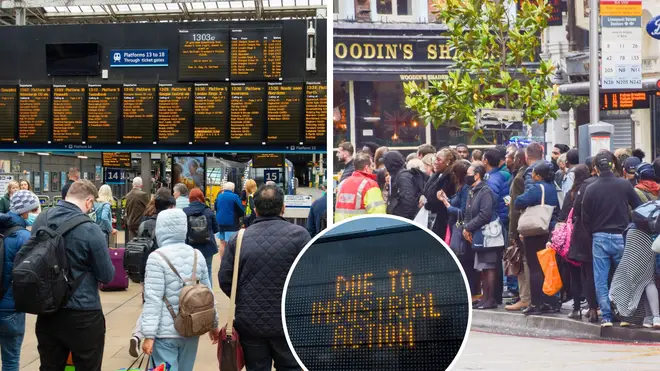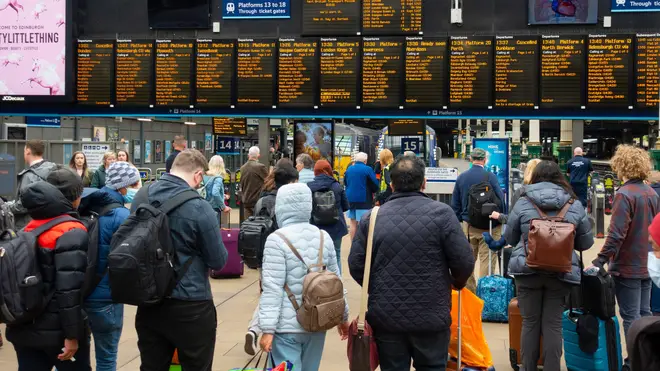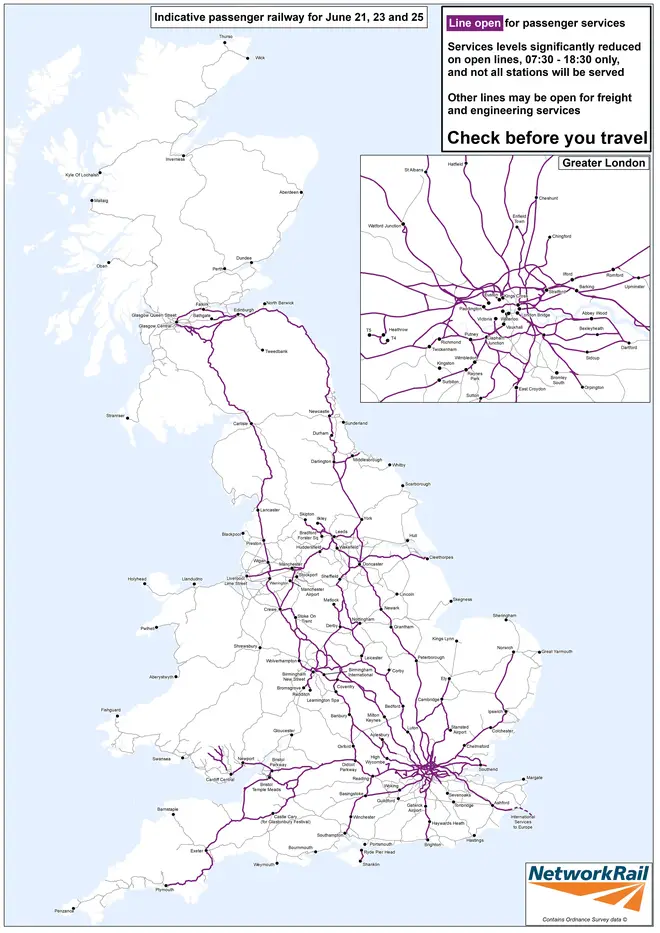
Matt Frei 10am - 1pm
16 June 2022, 13:58 | Updated: 20 June 2022, 07:46

Britain will be hit with its biggest national rail strikes in more than 30 years this week.
Considerable disruption is expected, with festival goers, GCSE students and holidaymakers among millions whose plans risk being scuppered - made worse by soaring petrol prices.
Here's everything you need to know to cope with the strikes.
Members of the Rail, Maritime and Transport (RMT) union are walking out because of disputes over pay,
The union is demanding its workers receive a seven per cent pay rise that keeps pace with inflation, to prevent workers effectively getting a pay cut as the cost of living soars.
The RMT said members have "no option" but to walk out this week - saying they've received no offer of a pay increase.He said any pay deal should be linked to the Retail Price Index - the rate of inflation on goods and services.
The rate was pushed up to 11.1 per cent in April but RMT's general secretary Mick Lynch said union chiefs were pushing for a pay deal linked to talks in December, when it was at 7.1 per cent.
Read more: Rail workers demand 7% raise as union 'gunning' for strike set to bring misery to millions

Another reason workers are striking is a looming threat of job cuts.
During the pandemic when footfall plummeted, £16bn was poured into the railways as a temporary measure to keep everything running.
But now, with changing passenger habits and increased working from home, ticket sales are still lower than pre-pandemic levels and a more long-term solution needs to be found.
The RMT union says that Network Rail is going to cut 2,500 rail maintenance jobs.
Network Rail said there would be no compulsory redundancies and is looking for its staff to "multitask", but the RMT is not convinced.

The RMT strikes will happen on June 21, 23 and 25, but a special timetable will be in place from June 20 to June 26.
The network is due to fully reopen after, but there is still expected to be residual disruption in the first days after the strikes.
Read more: New map shows rail strikes set to cripple network - which lines will be affected?

Rail boss says more efficient service can be brought in
It means they will coincide with the start of Glastonbury - when thousands of people will need to get to the festival in Somerset.
Cricket fans may also suffer, with the strikes clashing with England taking on New Zealand in the test match in Leeds.
It will also cause chaos for students needing to get to school for exams, commuters who are not able to work from home, and anyone else needing to travel who is not able to use another method.
It depends where you're going and when.
Network Rail, the public body of the Department for Transport, released details of its amended timetable on Wednesday revealing that around half of Britain's rail lines will be closed completely due to the strikes.

Barry Gardiner shares support for workers striking
If you're travelling to or from places with no services - such as Bournemouth, Swansea, Holyhead and Chester - you won't be able to get a train and you should find alternative ways of travelling.
If you're not in one of these areas, you are advised to avoid travelling by train if you can but there will be reduced services if you need them.
Passengers who must travel are urged to plan ahead to ensure that they can complete their journeys within the window, with last services from London to Scotland, for example, leaving in the early afternoon.
The last trains from London are as follows; to Edinburgh at 2pm, Leeds at 3.05pm, Newcastle at 3.43pm, Birmingham at 3.40pm, Manchester at 2.56pm, Liverpool at 3.31pm, Birmingham at 3.40pm, Manchester at 2.56pm, Liverpool at 3.31pm, Sheffield at 3.31pm, Nottingham at 4.09pm, Bristol at 4.33pm, Brighton at 5.50pm, Norwich at 4.30pm and Southampton at 5pm.
For more details see Network Rail's website.
Read more: Summer plans scuppered? Gigs, festivals, sport and GCSEs hit in biggest rail strike since '89
If you do have to travel, make sure you plan ahead to make sure your journey can be completed, and leave plenty of time.
Some operators - including Transport for London - have said there are "windows" where travelling will be easier. For example, TfL advises finishing your Tube journey by 6pm on Tuesday June 21, and don't try and travel before 8am on Wednesday.
Make sure you do your research before you leave to see if there are any times your operator says you should or shouldn't travel.
Roads are the main alternative to train travel for anyone able to get by vehicle but this will inevitably make them busier.
The RAC Foundation director Steve Gooding warned the worst will be seen on London's roads.
And the AA said: "The rail strikes will have an effect as some rail passengers may indeed plan to carry out their journeys by road instead.
Read more: Summer of discontent: UK's biggest union 'absolutely' willing to arrange 'national strike'
"If the strike goes ahead, the trouble will come for people who arrive at destinations unaware of the disruption on the rail network without time to plan, like travellers from abroad.
"This could lead to increased demand for private hire vehicles and rental cars."
Air travel might be possible but Britain's airports have been chaotic in recent weeks, as the aviation industry grapples with high demand but reduced staffing.